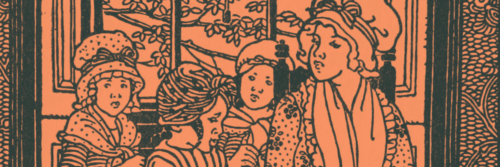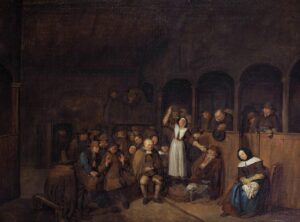
Female Education in the Early Republic
Although May and June are often seen as the “end” of the school year in modern America, June of 1787 marked the beginning of the brief existence of the Young Ladies Academy of Philadelphia. The Academy operated only from 1787-1804, yet during that period enrolled between 100-150 scholars at a time. Students came to Philadelphia primarily from around the mid-Atlantic (records also show students from Georgia, Canada, and the West Indies) to study a curriculum that included reading, writing, English grammar, mathematics, geography, rhetoric, composition, chemistry, and natural philosophy. The Academy also placed considerable emphasis on providing young women a visible civic role by holding annual public examinations that featured orations by students, prize awards for academic merit, and speeches in praise of female education by male visitors.
Faculty at the Academy included many of Philadelphia’s elite male thinkers, including physician and philosopher Benjamin Rush. Perhaps not coincidentally, in the same year that the Academy was founded, Rush published his “Thoughts on Female Education,” a brief apology for the importance of providing young women with a robust education in the new republic. We reproduce selected highlights from his remarks below.
Benjamin Rush, Thoughts on Female Education, 1787
…The first remark that I shall make upon this subject is that female education should be accommodated to the state of society, manners, and government of the country in which it is conducted.
This remark leads me at once to add that the education of young ladies in this country should be conducted upon principles very different from what it is in Great Britain and in some respects different from what it was when we were a part of a monarchical empire.
There are several circumstances in the situation, employments, and duties of women in America which require a peculiar mode of education. …
II. The state of property in America renders it necessary for the greatest part of our citizens to employ themselves in different occupations for the advancement of their fortunes. This cannot be done without the assistance of the female members of the community. They must be the stewards and guardians of their husbands’ property. That education, therefore, will be most proper for our women which teaches them to discharge the duties of those offices with the most success and reputation.
III. From the numerous avocations to which a professional life exposes gentlemen in America from their families, a principal share of the instruction of children naturally devolves upon the women. It becomes us therefore to prepare them, by a suitable education, for the discharge of this most important duty of mothers.
IV. The equal share that every citizen has in the liberty and the possible share he may have in the government of our country make it necessary that our ladies should be qualified to a certain degree, by a peculiar and suitable education, to concur in instructing their sons in the principles of liberty and government. …
The branches of literature most essential for a young lady in this country appear to be:
I. A knowledge of the English language. She should not only read but speak and spell it correctly. And to enable her to do this, she should be taught the English grammar and be frequently examined in applying its rules in common conversation.
II. Pleasure and interest conspire to make the writing of a fair and legible hand a necessary branch of female education. For this purpose she should be taught not only to shape every letter properly but to pay the strictest regard to points and capitals. …
III. Some knowledge of figures and bookkeeping is absolutely necessary to qualify a young lady for the duties which await her in this country. There are certain occupations in which she may assist her husband with this knowledge, and should she survive him and agreeably to the custom of our country be the executrix of his will, she cannot fail of deriving immense advantages from it.
IV. An acquaintance with geography and some instruction in chronology will enable a young lady to read history, biography, and travels, with advantage, and thereby qualify her not only for a general intercourse with the world but to be an agreeable companion for a sensible man. To these branches of knowledge may be added, in some instances, a general acquaintance with the first principles of astronomy and natural philosophy, particularly with such parts of them as are calculated to prevent superstition by explaining the causes or obviating the effects of natural evil.
V. Vocal music should never be neglected in the education of a young lady in this country. Besides preparing her to join in that part of public worship which consists in psalmody it will enable her to soothe the cares of domestic life. The distress and vexation of a husband, the noise of a nursery, and even the sorrows that will sometimes intrude into her own bosom may all be relieved by a song, where sound and sentiment unite to act upon the mind. …
VI. Dancing is by no means an improper branch of education for an American lady. It promotes health and renders the figure and motions of the body easy and agreeable. I anticipate the time when the resources of conversation shall be so far multiplied that the amusement of dancing shall be wholly confined to children. But in our present state of society and knowledge, I conceive it to be an agreeable substitute for the ignoble pleasures of drinking and gaming in our assemblies of grown people. …
The influence of female education would be still more extensive and useful in domestic life. The obligations of gentlemen to qualify themselves by knowledge and industry to discharge the duties of benevolence would be increased by marriage; and the patriot–the hero–and the legislator would find the sweetest reward of their toils in the approbation and applause of their wives. Children would discover the marks of maternal prudence and wisdom in every station of life, for it has been remarked that there have been few great or good men who have not been blessed with wife and prudent mothers. …
To you, therefore, YOUNG LADIES, an important problem is committed for solution; and that is, whether our present plan of education be a wise one and whether it be calculated to prepare you for the duties of social and domestic life. I know that the elevation of the female mind, by means of moral, physical, and religious truth, is considered by some men as unfriendly to the domestic character of a woman. But this is the prejudice of little minds and springs from the same spirit which opposes the general diffusion of knowledge among the citizens of our republics. If men believe that ignorance is favorable to the government of the female sex, they are certainly deceived, for a weak and ignorant woman will always be governed with the greatest difficulty.



